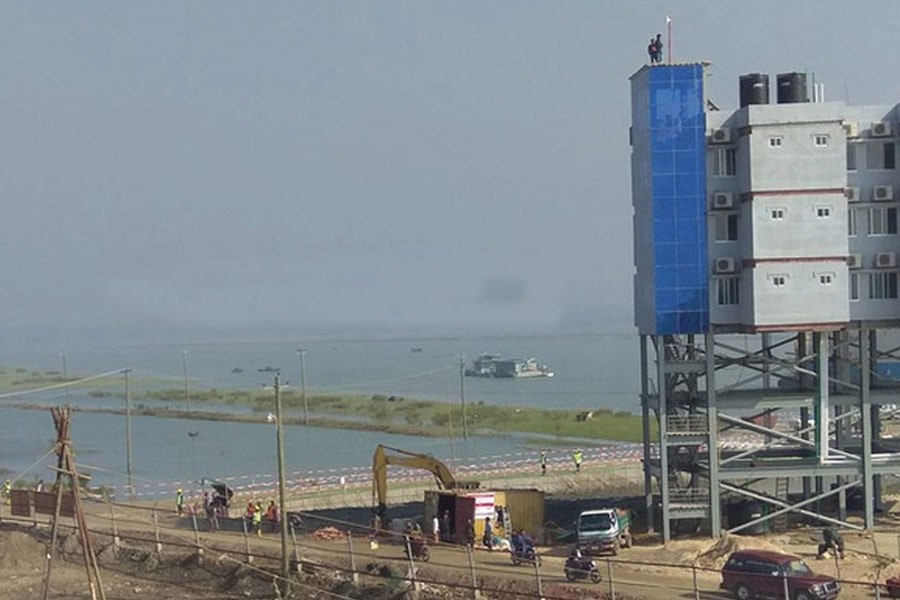Bangladesh-India Friendship Power Company Limited (Rampal power plant) has invited international bids for coal transportation including transhipment for the 1320 MW coal-fired power plant at Rampal, Bagerhat. The international bidder is required to transport coal from designated load ports to offshore transhipment sites and arrange transhipment facilities to unload the coal and further transport it to the power plant site using self-propelled barges. The bidders are to submit their bidding documents by June 19, 2019.
The Bangladesh-India Friendship Power Company Limited (BIFPCL) is the first among three major under-construction coal-fired power plants in the coastal areas of Bangladesh (Matarbari 1200 MW, Payra 1320 MW and Rampal 1320 MW) to invite such bidding. Although it was said that the first 660 MW unit of the 1320 MW Payra power plant (BCPCL) would start producing power within 2019 with imported coal, power generation from Payra coal-fired power plant is likely to be delayed. Neither Payra nor Rampal power plants have their coal terminal ready and none of them has jetty or ports which can accommodate ocean going large coal carrying ships. Therefore, it is the only option for BCPCL (and Payra coal-fired power plant) to try to invite internationally experienced companies who can render services to the power company (NWPGCL-CMC China) to transport coal using both ocea- going ships (like Handimax, Panamax or Cape). The service company should also facilitate to unload coal at the open sea using transhipment facilities and further transport them by small self propelled barges to the plant site. Such barges should have the capacity to sail in the shallow waters from the sea to Harbaria channel and through the river systems to Rampal power plant jetty. The transportation is likely to be targeted from Indonesia (load port) to the power plant site. No doubt, the coal transportation cost will be high, especially for their multiple handling and for utilisation of mixed mode of transports. Also the Rampal and Payra coal-fired power plants will have to match their coal importation schedules with weather behaviour in the Bay of Bengal (notorious for its cyclone frequency). The Bay of Bengal hosts major atmospheric depressions and tropical cyclonic storms during May-November each year. Therefore, transhipment of coal from the large ocean-going vessels (with cargo carrying capacity of 40,000 tonnes to 120,000 tonnes) in the open sea to the small vessels has to be carefully planned to avoid demise of the cargo and the carriers. No doubt the international coal and bulk cargo transportation companies will add additional charges for the risky operations to deliver coal in the Bangladesh coast lines.
Unlike Payra and Rampal power plants, the Matarbari 1200 MW under-construction coal-fired power plant has included the excavation of a 14.3 km long, 250m wide and 18.5 meter deep channel and construction of a coal jetty in its contract signed in July 2017. The land development works for the power plant has been progressing and the first unit (600MW) of the power plant should come into operations in January 2024 followed by the second unit (600MW) in July 2014. As reported, 70 per cent work for land development and channel excavation has been completed and the coal jetty construction work would be completed in 2021. Once completed, the coal jetty can facilitate import of 4 (four) million tonnes of coal to feed the Matarbari 1200 MW power plant annually. With additional investment, the capacity of the coal jetty can be enhanced to facilitate larger volumes of coal import for supplying them using conveyor belts (for example, for the planned coal-fired power plant at Maheshkhali). The 18.5-metre deep and 250m-wide long channel will enable the Matarbari coal-fired power plant authority (Coal Power Generation Company Bangladesh Ltd-CPGBL) to import coal using ocean-going vessels having carrying capacity of 80,000-120,000 tonnes. Such large ships can significantly reduce coal-carrying costs and avoid the requirements for transhipment in the open sea.
It is a common knowledge that there is an additional cost involvement for operating coal-fired power plants due to the environmental concerns and compliance needs. However, public and private companies opt to use coal as major fuel for power generation due to its comparative cost advantages over LNG and liquid fuels. But due to certain limitations in planning and its implementation, two imported coal-based power plants, Payra and Rampal have proceeded without construction of coal terminal and port channel to allow large coal-carrying vessels. This may prove to be costly. This will result in the coal-fired power plants which import coal using small barges and involve transhipments and multiple handling, generating costly power.
Mushfiqur Rahman is a mining engineer and writes on energy and power issues. [email protected]


